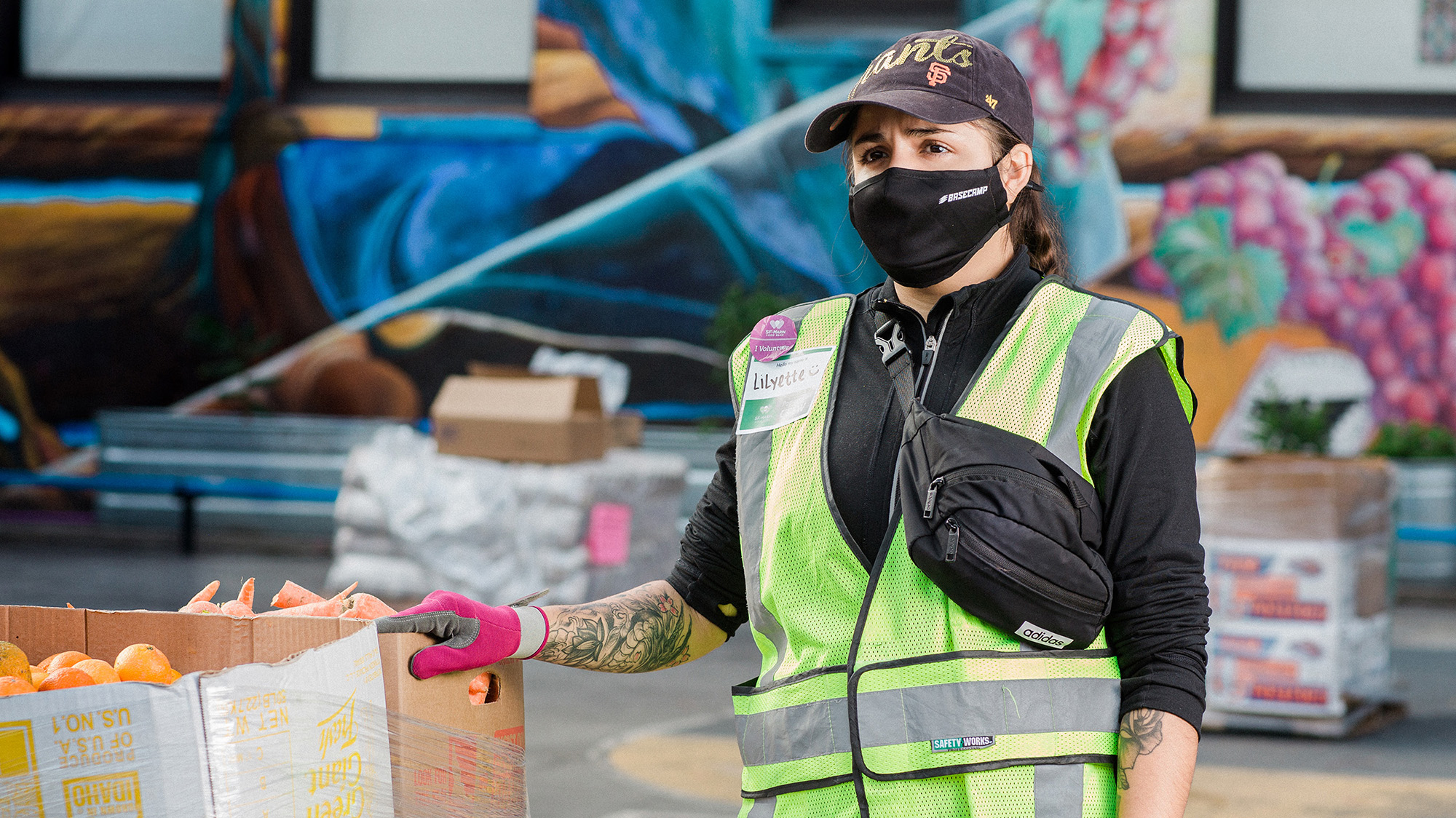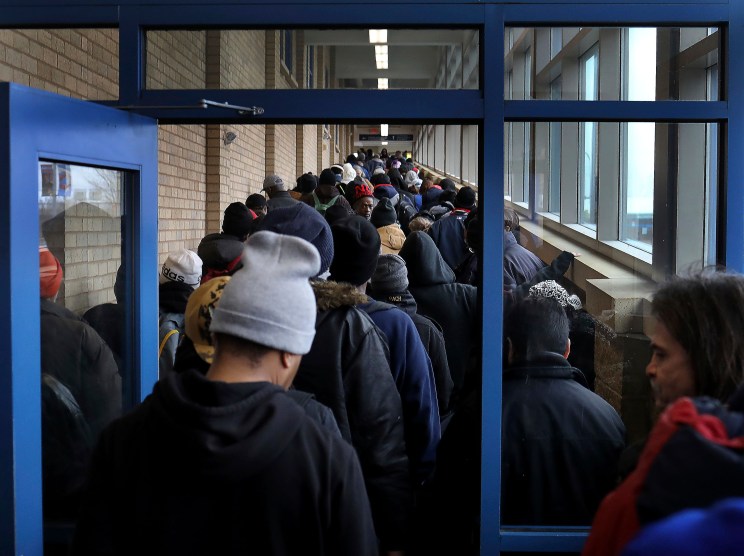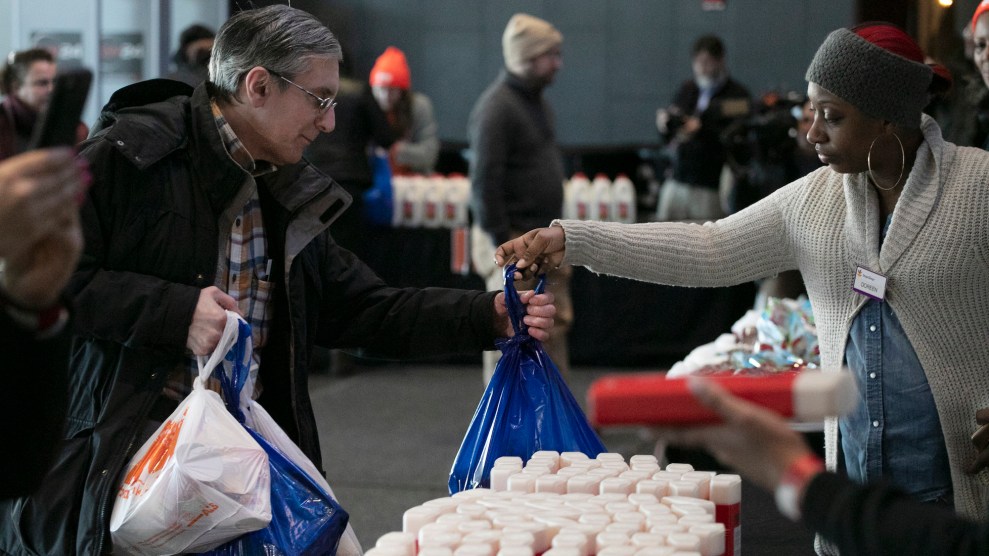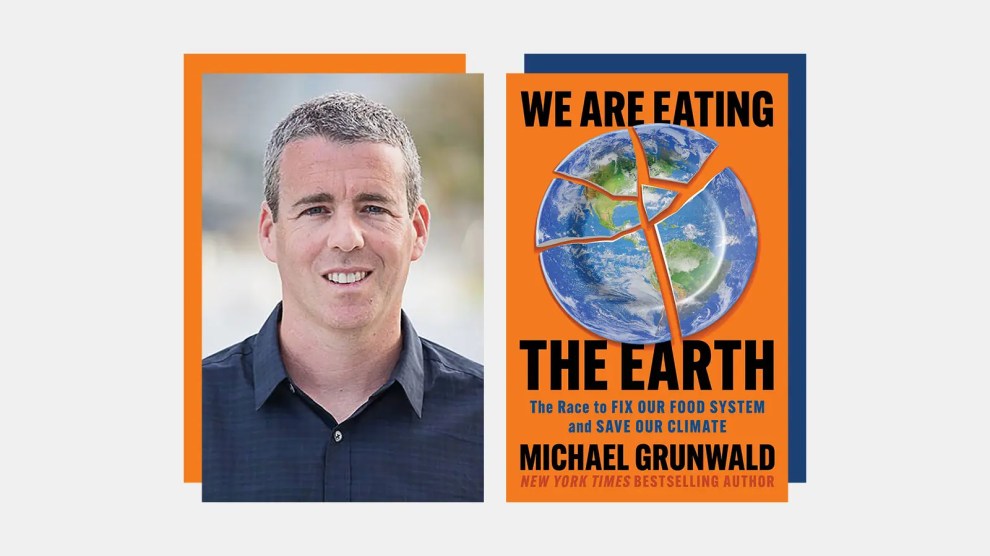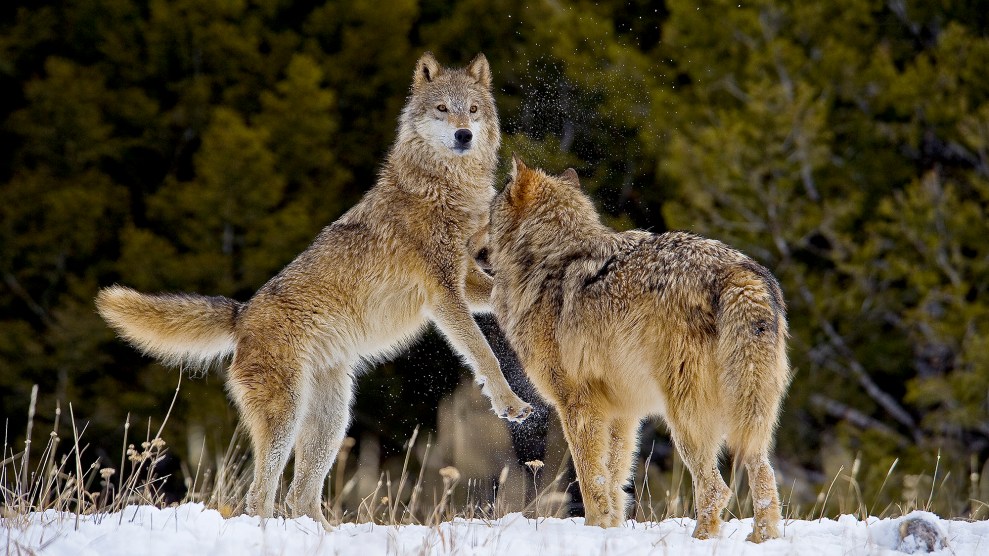On the corner of her block in Queens, New York, Calli Carvajal, an out-of-work hair stylist, watched the line at a food pantry grow. This was back around March, at the start of the pandemic, and volunteers at a church were handing out bags of groceries to families in need during the new lockdown. At first, a dozen or so people stopped by for assistance each day. But as the weeks passed, the line wrapped around the block, as more workers lost their jobs. “Oh my God, this is crazy—nobody can afford food,” Carvajal thought as more neighbors flocked to the pantry. She thought about getting in line, to help feed her kids now that she no longer had an income.
The economic devastation wrought by the pandemic has led to enormous food insecurity across America. In the spring and summer, aerial footage in city after city showed cars inching along for miles, all waiting in line for a box of pantry staples. New Census Bureau data shows that almost 1 in 5 households with children said earlier this month that they do not have enough to eat. And one of the country’s biggest anti-hunger organizations, Feeding America, experienced a 60 percent surge in people using its food bank services this year, according to a recent report. About 4 in 10 were seeking assistance for the first time.
Even San Francisco, one of the world’s richest cities, has seen a similar story play out. In mid-December, photographer Amy Osborne went to meet some of the people standing in line at pop-up food pantries around the city, from bartenders and chefs to recently laid-off tech workers and people like Carvajal, who moved from New York in August to stay with her elderly parents there.
The food pantries are especially crucial in San Francisco because many of its residents don’t qualify for federal food stamps, known as SNAP: Eligibility standards for that program are set at a certain income level, often excluding families in places where the cost of living is much higher. The San Francisco-Marin Food Bank, which organizes the pop-up pantries that Osborne visited, now serves nearly double the people it did previously.
The need could be even greater in the coming months, amid surging coronavirus cases and more lockdowns. Congress has agreed on another relief package that will include a second stimulus check of $600 for some people, but that’s not much considering the cost of rent and groceries in the area.
Below are portraits of some of the people turning to San Francisco food pantries, and vignettes of the worries and struggles they face, in their own words.
Nancy Kuo, 34, banquet server
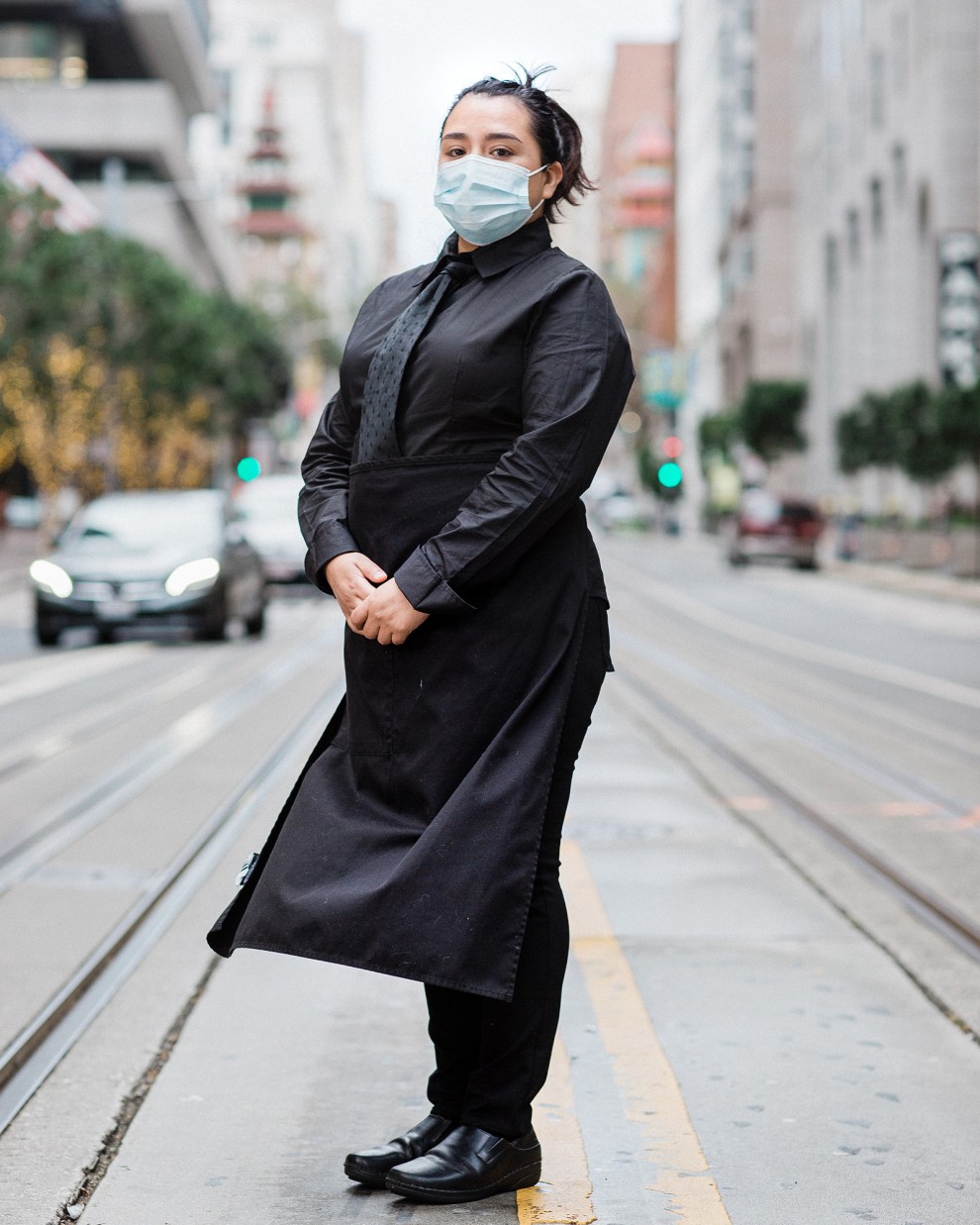
Nancy Kuo, pictured in downtown San Francisco, near the busy banquet hall in the Merchants Exchange Building where she worked before being laid off during the pandemic.
I lost my job due to the pandemic in March. In June, a close family member who doesn’t live with me caught COVID in Mexico City. She was close to passing away, but she recovered. Around the time I started having bad anxiety, panic attacks, because of the stress. I would wake up with fear. So walking my three little dogs helped me a lot.
I’ve been applying everywhere. Target, Starbucks. See’s Candies. They said they would call and they never did, then they called back and apologized and said they’d call again, and again they didn’t. My husband is in the same situation—he works for the San Francisco opera house, and they are currently closed. I applied for food stamps but was denied; they needed more paperwork. I’m going to try again.
The first time I went to the food bank, it was a little bit of mixed emotions. I was like, I can’t believe I actually qualified, so there was excitement. And then at the same time it also hits me: This is what it’s gonna be like for a while until I get a job.
Maria Teresa Palacio, 53, house cleaner
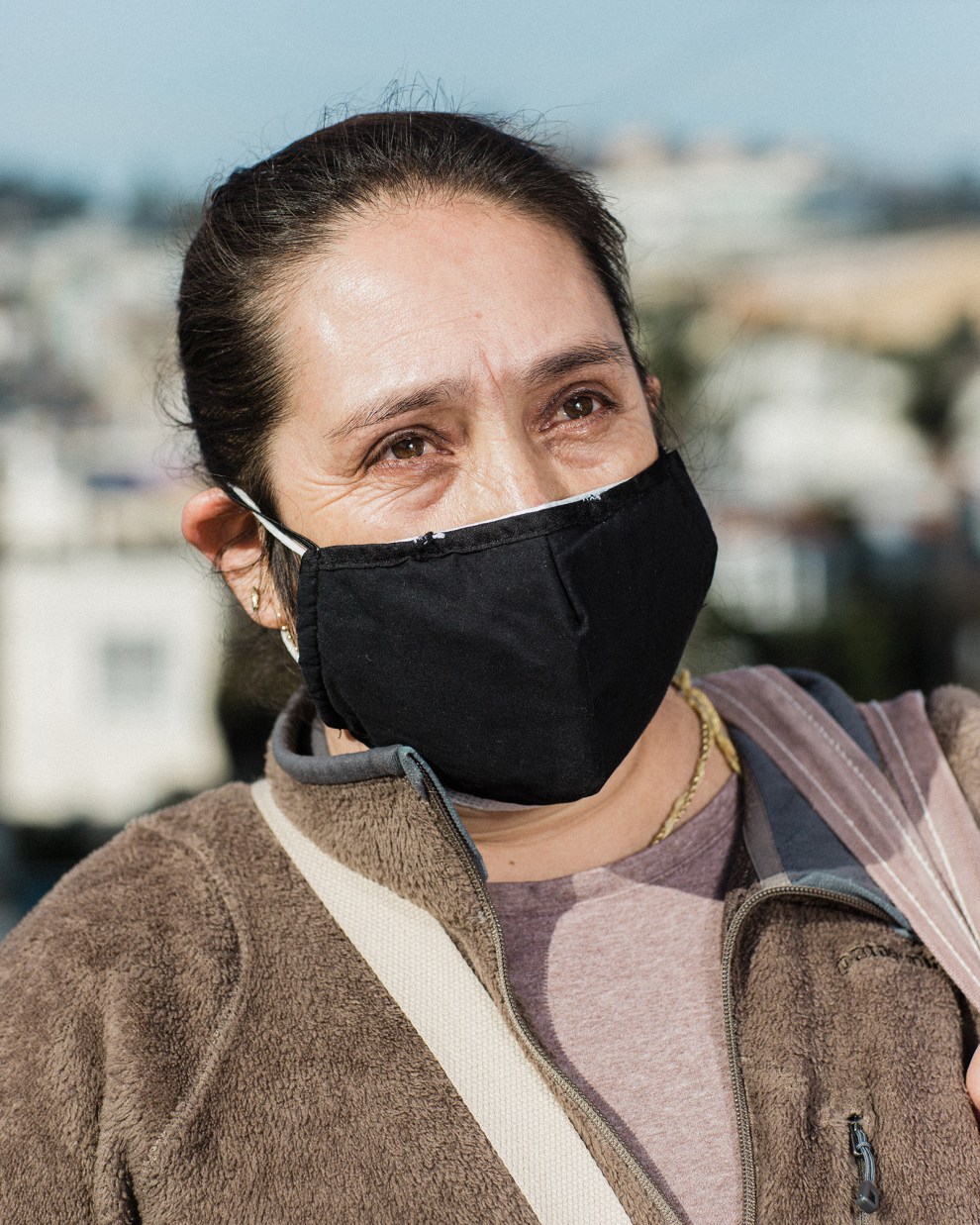
Maria Teresa Palacio after waiting in line to receive food aid and just before hustling to the bus stop to a housecleaning job. Palacio has lost most of her clients since the pandemic started.
Before I worked more; now I have only three days a week sometimes. They cancel me a lot. And some customers moved out from here. I work for the old people still because they really need me, but I’m worried. I’m always careful because I wear my mask and gloves and everything, but still, you never know what might happen. And the ladies are more than 90 years old. They stay in one side and then I’m working one side, and then we change. I worry, but I need to work because I am a single mother and I got my son, who’s 20.
I was walking to work and I saw a lot of people, and then one day I go there and they told me, “Yeah, you can get some food.” But I don’t go every Wednesday. I worry because there’s too many people—the line is more and more. I don’t want to contract anything because I live in a small place and we share the bathroom, and I don’t have another place to stay.
Maybe he [Trump] helped, but only the people who are a citizen. I’ve lived in San Francisco for 30 years, but for people like me, he don’t give us anything. My son, he is a citizen, but he don’t get [the first stimulus check]. And he’s working, he’s doing his taxes, but they don’t give it to him. When one is citizen and one is not, I think they don’t give the money.
Wayne Narruhn, 42, bartender
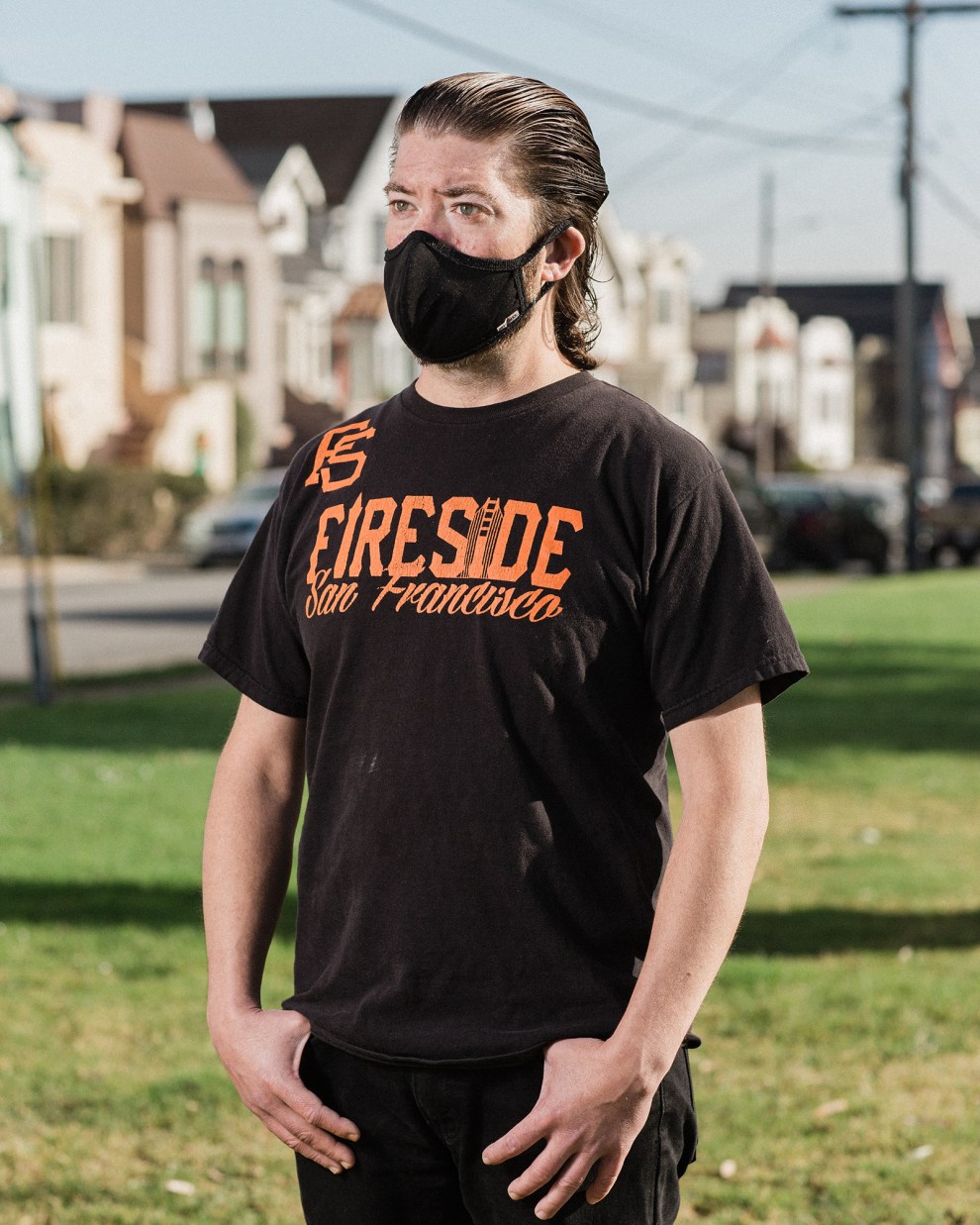
Wayne Narruhn, a bartender, in the park near his mother’s house, where he is currently residing.
Me and my mom go there, to the food pantry. Up until mid-September the line was short. But lately the lines have been getting longer. And today was the longest I’ve seen, wrapping around the block. I’m a bartender and I work for big events and for a local bar. So I’ve been out of work since March 13. I’m lucky enough to be born and raised here and able to move back in with my mom. She grew up in rural Ohio, a child of 12, so food was always scarce. What she told me is, “You might not like it, but you have to do what you have to do to survive right now.” All of her kids are in the event industry—three of us are bartenders.
At first when I went, there was a little bit of shame and guilt. It’s like, you never thought you’d be here. But at the same time, here you are. And just seeing how everyone was so kind and just trying to help, it actually restored some faith in humanity. I have to say, these volunteers, I wish they were getting paid—I wish the government would do something for them. Because they’re essential workers who have been giving their all, and I don’t know they’re getting enough thanks.
Yeah, we’re getting the stimulus, but for some of us it’s nowhere close to what we used to make. And right now, we have no stimulus and a lot of us are hurting. I’m watching friends lose their jobs; I know some people who are worried about being homeless. We just want to go back to work. It feels like the Republicans dropped the ball. If they took care of this in the first two months, just shut down everything, I think we would have been in a better spot.
Lorena Hernandez, 56, city gardener
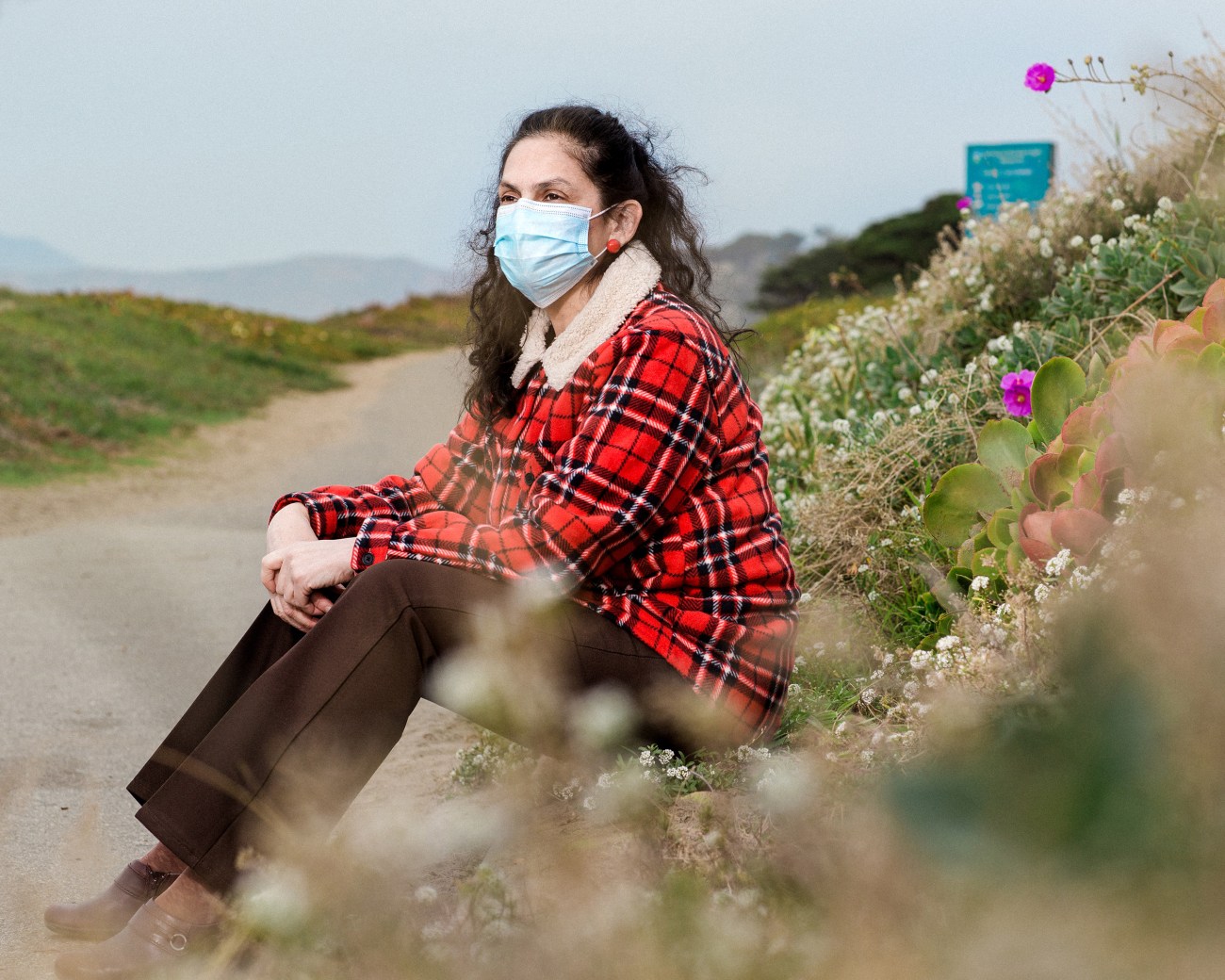
Lorena Hernandez sits in one of the areas she used to garden for San Francisco’s Recreation and Parks Department.
I was laid off in August—I’d been working at Golden Gate Park, for Rec and Parks. And it looks like I’m going to run out of unemployment soon. The city is saying they have a deficit of millions of dollars, so these jobs are not going to open again.
Before getting food here, I was a volunteer with the food bank. It was frustrating because you would see like 700 cars a day coming to pick up food. And I was thinking, a lot of these cars are Mercedes or Lexuses even, really fancy, with people showing their cellphones to show their pass, that they are allowed to pick up food, and they’re nice cellphones. I don’t have a cellphone. I don’t have a car. I was like, some of these people probably own homes, and they are still getting food.
So who really needs the food? It’s hard to tell, right. When I went to the other place to pick up the food one time, I saw my previous landlord getting food. And he owns a lot of buildings in San Francisco. I don’t have cable, I don’t have a lot of money in the bank, I still owe my credit cards. Some people are taking advantage, and it affects the ones who are really more poor. That’s just one thing that makes me upset. Because I understand that some food banks run out of food and they have to turn people away. Leave it for people who really need it.
Herb Williams, 59, office administration
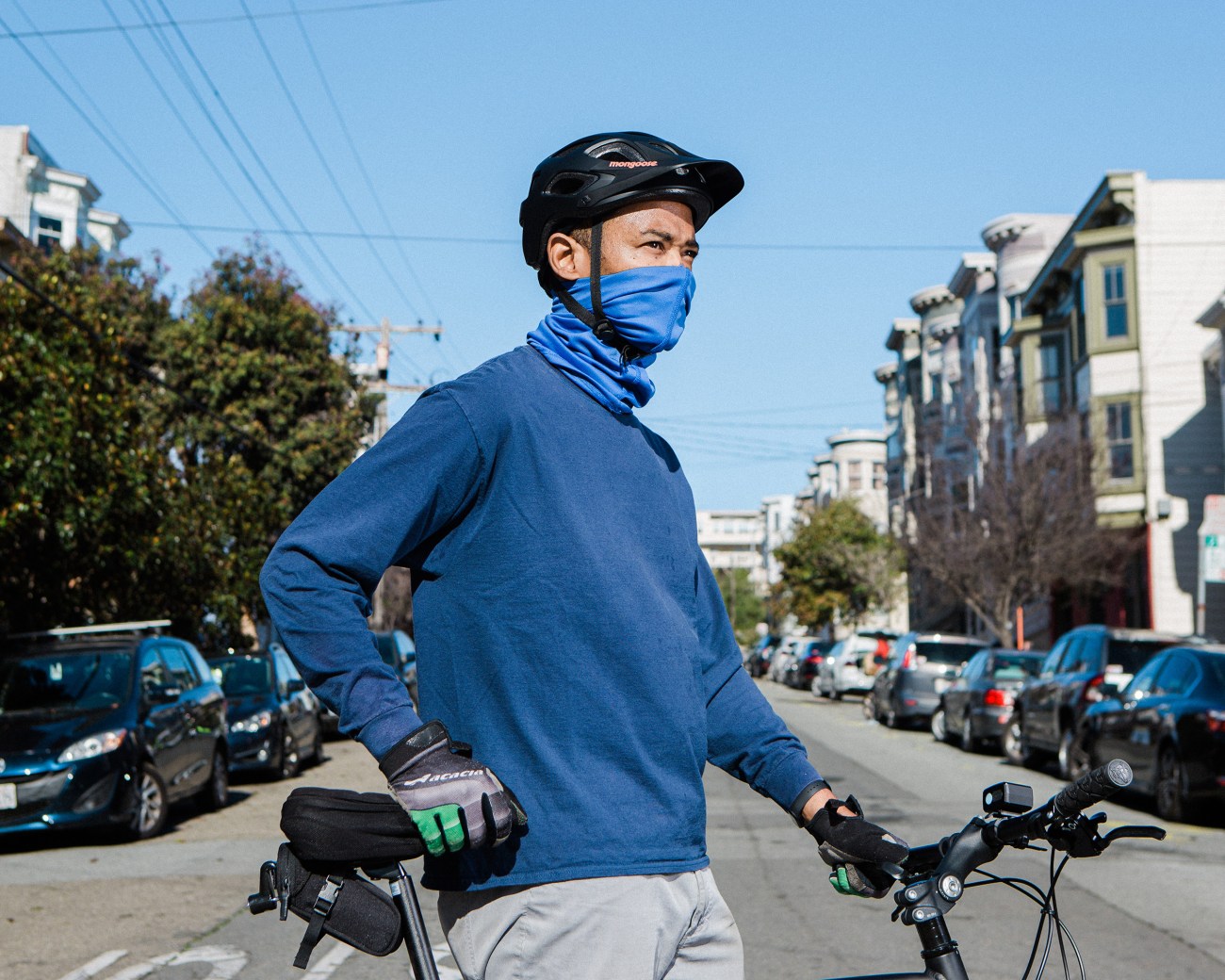
Herb Williams with his bike in mid-afternoon, when he’d normally be working at the big accounting firm downtown in the heart of downtown San Francisco. Herb was laid off in June.
I had a job of 12 years, doing basic office work for a big accounting firm downtown, and part of my duties was ordering supplies. After they closed the office, they asked if anyone could come in: I was one of like three or four people who would show up every day, whereas we usually have 1,500 people show up. Then in June I got an email about the dreaded Zoom call. They said my last day would be tomorrow.
They give a good amount of food; I had trouble getting it all in my backpack. It was a heavy thing—and I was in the Marines. Being there, you know, I wasn’t embarrassed. People are pleasant. It’s easy not to be embarrassed when you have a mask on. [Laughs.]
John Clark, 45, cook
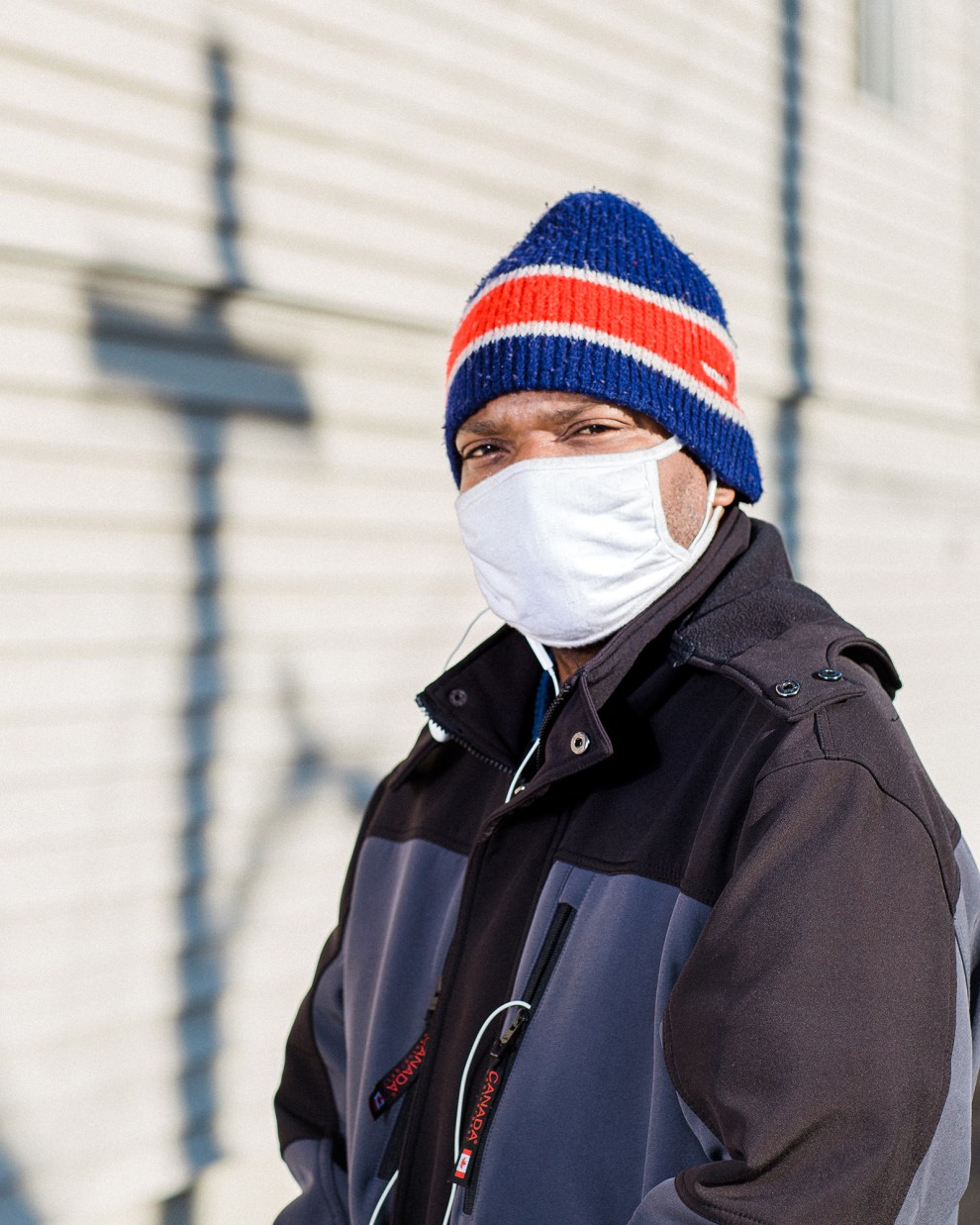
John Clark after collecting a few bags of food from a pop-up food bank distribution site.
Sometimes I run out of fruit and vegetables for the kids, since they all live at home doing schoolwork now and they can’t go to school. I got four kids, plus my nieces and nephews, that’s seven. The oldest is 18, and the two little ones are 5.
I was working as a chef for the pizza place. They started cutting our hours, and they weren’t helping me pay no bills. I ended up having to get my unemployment. I just wish I was working. I’m looking now: I got a family member, he said he needs some help at the homeless shelters at night. My unemployment benefits run out one day after Christmas.
Micah Weiss, 40, tech
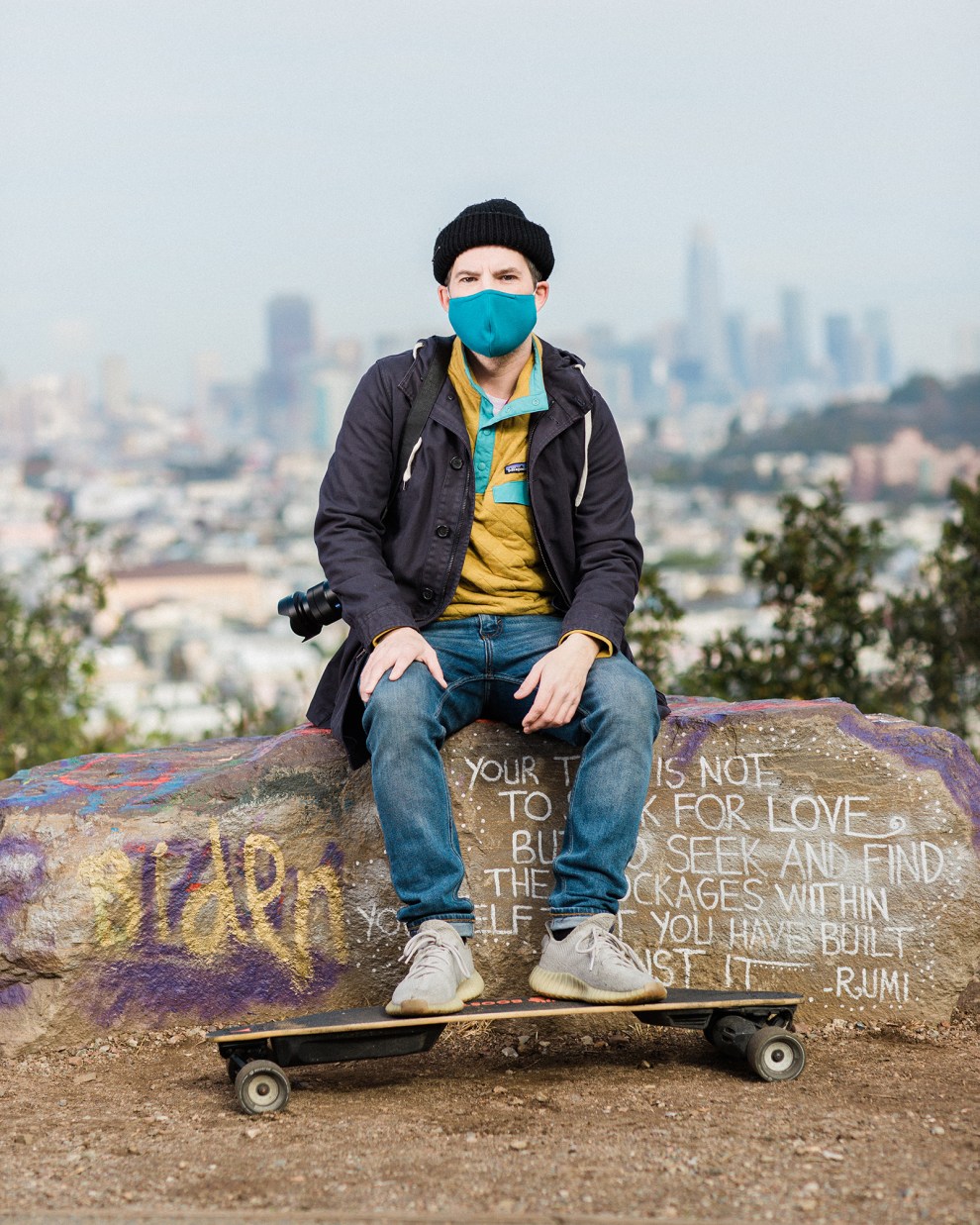
Micah Weiss, a freelance photographer and tech worker, sits with his camera and electric skateboard in Bernal Heights.
I was working for a company called One Hundred Feet that is making an app for delivery drivers. Say you work for Uber Eats, if Uber bought this and let their employees use it, the driver would pull it up and it would give them a map that showed where they can leave their car for just the five, six, seven minutes they need to run an order into a building. So I was going around taking photos to help them build this mapping system. I lost my job in March, because I couldn’t go into the buildings anymore to take the photos.
I started looking for new jobs like two months into lockdown, and answered an ad on Craigslist to be a personal assistant and personal chef for a couple that runs a software company. But now because we’re on the second lockdown, my job with them is on hold until things get better.
[At the food pantry] I felt a little guilty because I grew up very privileged and never needed to do anything like that. We came from a lot of money. But both my parents are now passed away, and the rest of my family lives all over the place. I’ve got a brother in Vietnam, two sisters in Detroit. And yeah, I guess I just felt guilty because I felt like maybe there were other people who needed it more.
Lilyette Diaz-Gallegos, 24, cook
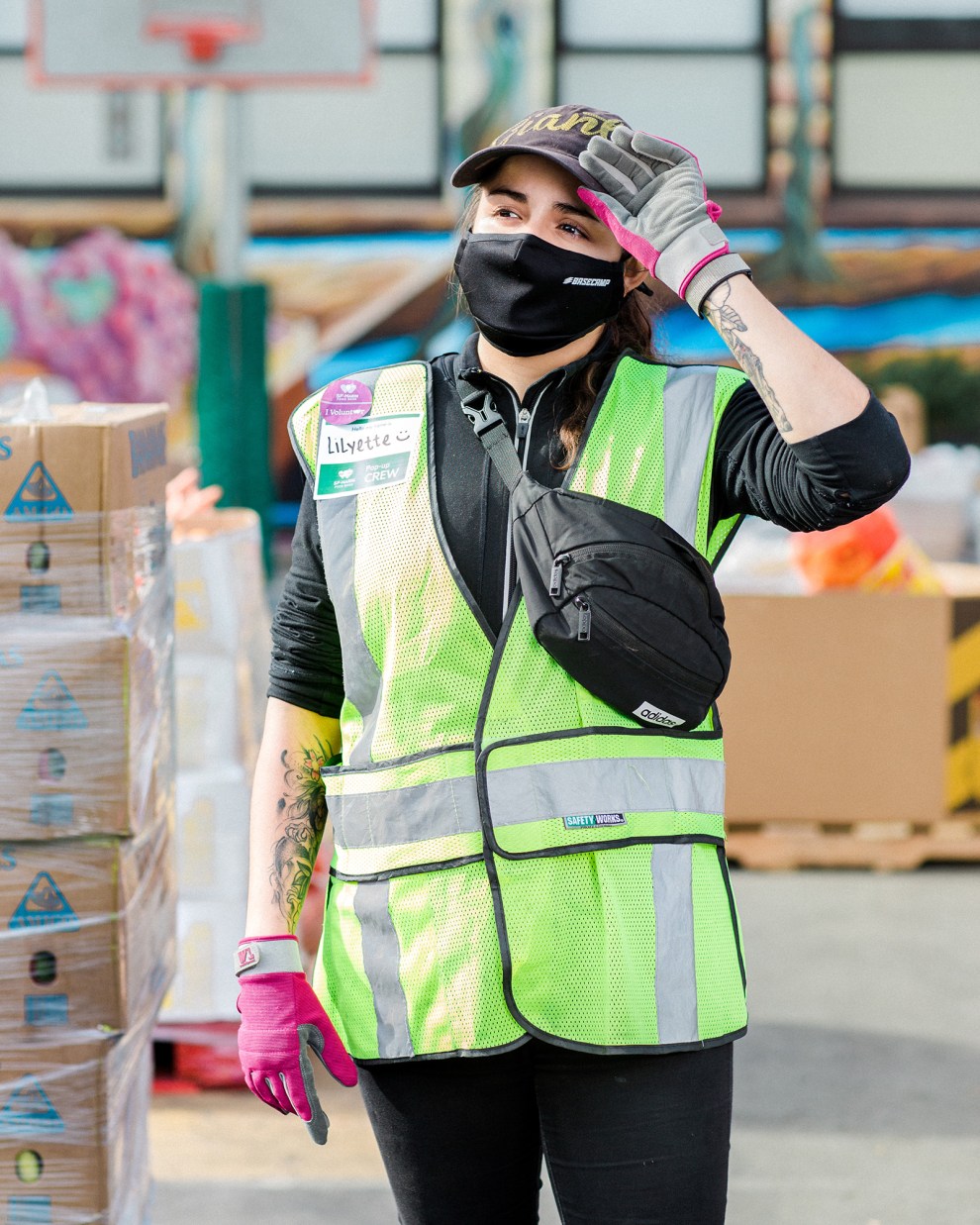
Lilyette Diaz-Gallegos after working a shift at one of the many new pop-up distribution sites for the SF-Marin Food Bank.
I live with my two parents and my three siblings, all younger than me. That’s basically the reason I go, so I can feed everyone in the house. Since I’m the chef here, I cook everything. I just love how you can look at any fruit or vegetable, a potato or tomato, and there’s so many ways you can work with it. You can create soups, roast them; some stuff you can eat raw. There’s just so many different choices.
I was working primarily at the Pacific-Union Club, like a gentlemen’s club or social club technically, as a line cook. And at Farallon Restaurant, which serves seafood and fine dining. Because of the lockdown, I basically got laid off as well as everyone else. I applied for about 13 jobs. I started off trying to find restaurant jobs, which I couldn’t find. I tried Trader Joe’s, Whole Foods, a golf club, Fairmont hotel. I tried so many places, even Safeway. There was no success with any of them.
To have found the food bank is really a blessing; I’m also working with them through Instawork. To be honest, I would say like medical insurance and stuff, that’s what I really need assistance with. I have a little bit of unemployment left, like a month or two, and I’m pretty worried. I personally think if they did send more than one stimulus check, like monthly, it would have helped more. Instead of like one every six or eight months—everyone’s still struggling after that one amount.
Jacob Lavinghouse, 35, stagehand and guitar craftsman
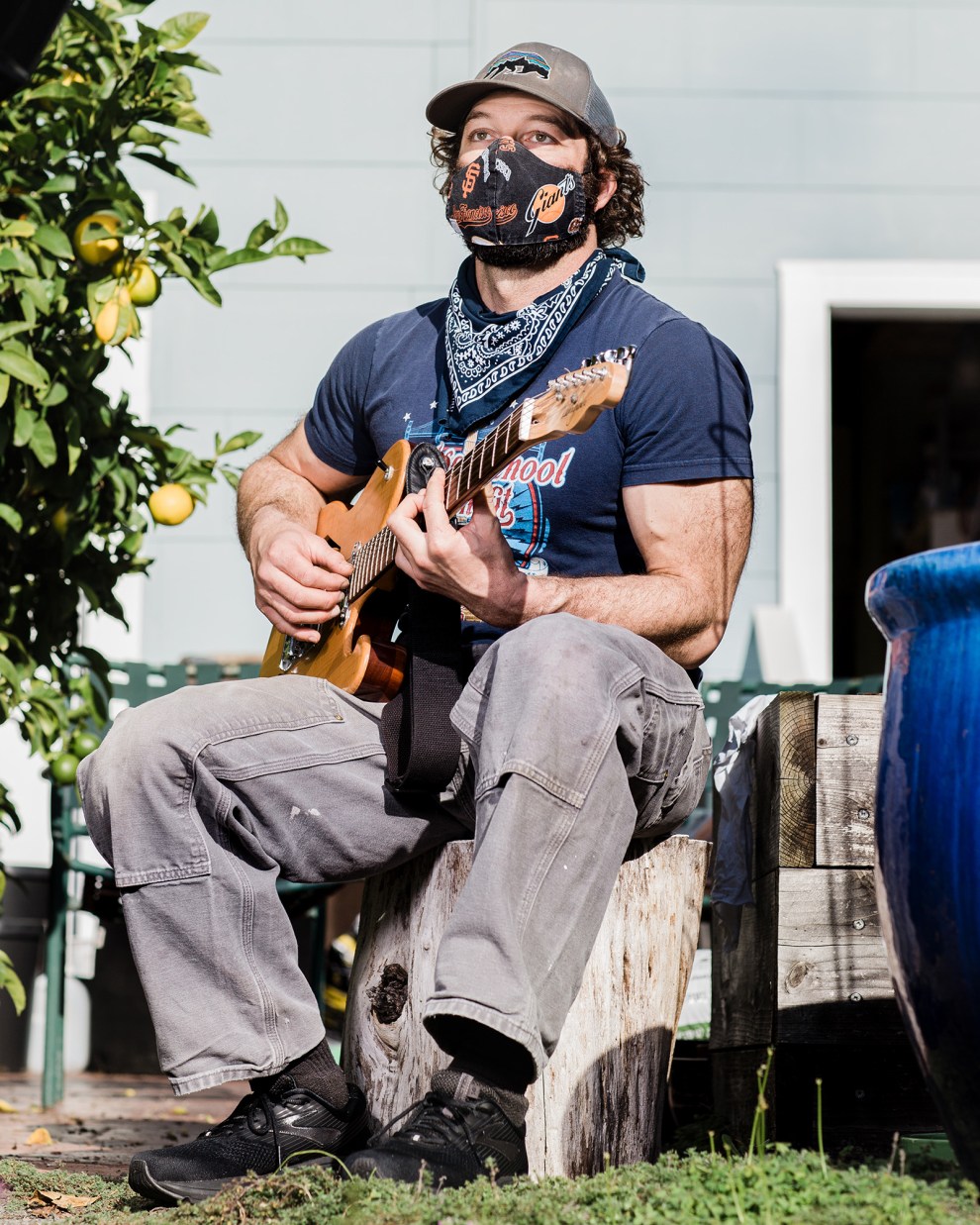
Jacob Lavinghouse with a guitar he made at his parents’ home.
I lived with a couple of roommates last year, they moved out, and then I got another roommate a few months ago and then he moved out. There’s a lot of people moving out of San Francisco right now—moving back home to Nebraska and making the same money coding in their living room there, paying $400 for rent or whatever. So it’s been hard to keep roommates, which is why it’s been hard to pay rent. I’m getting $450 as a weekly benefit for unemployment, which comes out to $1,800 a month. And my rent is $2,100 a month.
I’ve thought about moving, but there’s a lot of complicated factors. I have asthma so I’m in a high-risk group for COVID, so I’m not trying to go around a bunch of places and interview. Also I’ve been unemployed all year and haven’t been making money, and landlords want to see an income check. I’m in a little bit of a bind. I primarily make my money as a stagehand, and there’s been no gigs. And a guitar repair job is like $50 or $100, and I might get that once every couple of weeks. People don’t have a lot of money right now to spend on buying custom instruments. I’ve burned through half my life savings just paying rent and eating.
It’s hard to not feel some sense of failure. There’s a lot of stigma that goes along with getting a handout. I tried as long as I could to hold out because I didn’t want to be taking food from people who needed it more than me. Standing in line, I think it’s that sensation where you’re not in the place where you wanted to be in your life, and grappling with what that means and what it means to be a successful person in this society. Is it now normal to be standing in the food line—is that okay? Do we want to be the kind of people who take care of each other and don’t put people down when they’re in need, or do we want to be shaming people who aren’t successful, shaming people who need assistance?
Calli Carvajal, 45, hair stylist and wig stylist
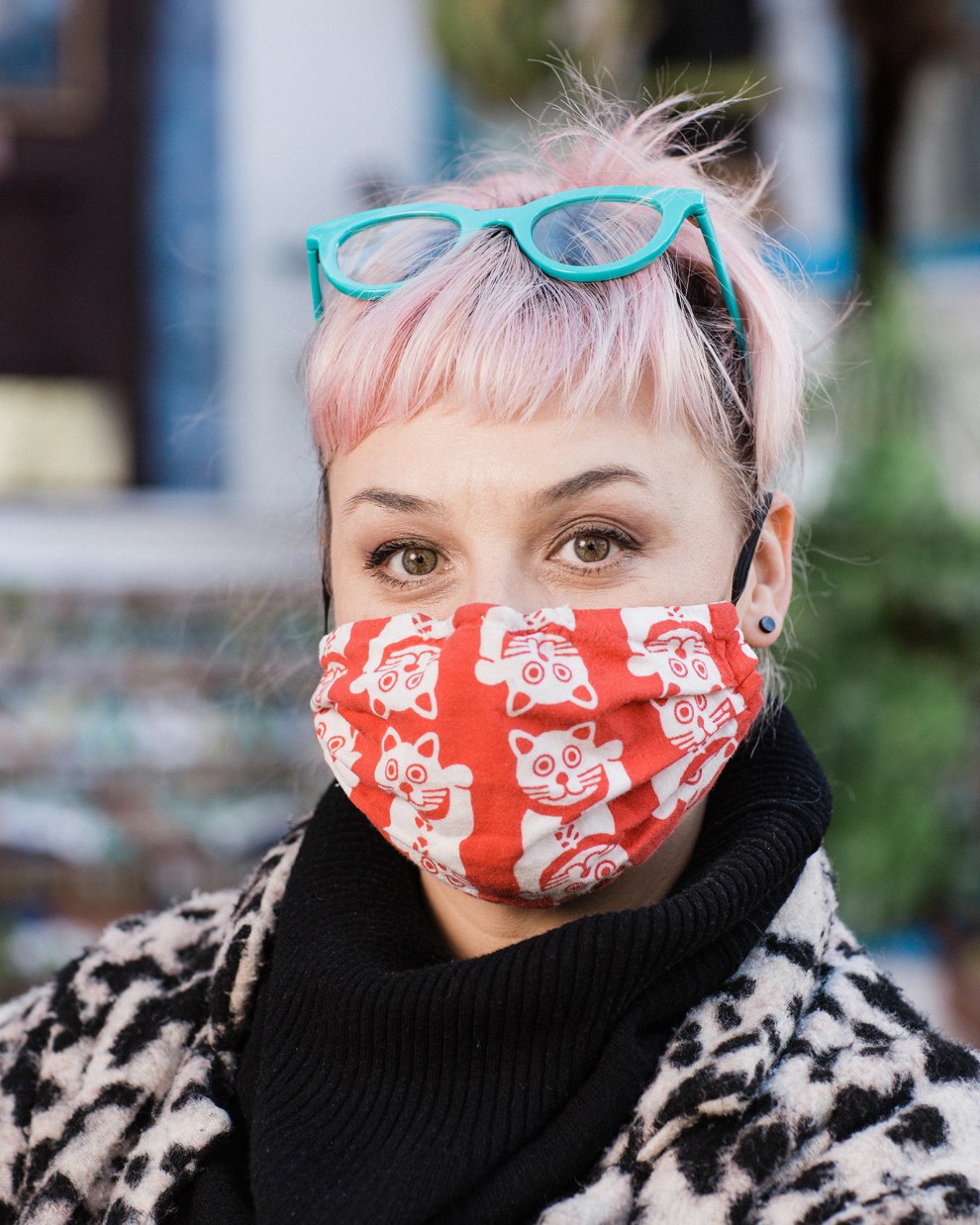
Calli Carvajal sits on the stoop of her parents’ home in San Francisco.
I just recently moved back from New York City with my husband and my two little children because we couldn’t afford rent there with both of us having no jobs. We’d been there for almost 20 years.
My youngest is two. I had been just getting right back on my feet again from maternity leave. I was working with this company helping cancer patients fit wigs, so when the pandemic happened, we had to shut down. My husband is a musician, a drummer, and was playing with big wedding bands and jazz bands. And then he couldn’t get unemployment [benefits] for months because of some weird glitch in the system.
Watching all my people starting to do their own hair at home was devastating. But I was scared: I know several people who passed away in New York when this was first happening. And seeing trucks of people in bags, dead people…I didn’t want to give it to my family, if I went out and worked. Now I’m here with my dad, who is 89, and my mother who is 72, so we’re being extra careful. Brian has been working outdoors, busking, but honestly, $40 a week doesn’t really help.
I never thought I’d be standing in one of those lines and okay with it. I feel like it’s okay, just let it be. Don’t have an ego about it. Because everybody else here is probably feeling the same way. You know? It’s okay to ask for help or need help. You just do it. And you start making friends in line.
